Arava Institute alumna Zobida Ezery and I spent four cold, wet January days in London in pursuit of our mission to promote the message “Nature Knows No Borders” in the United Kingdom. We were hosted by the UK Task Force for Israeli Arabs, a coalition of Jewish philanthropic organizations in Great Britain who work to raise awareness of Israeli Arab perspectives in the British Jewish Community. Zobida and I spoke to a group at the ORT House in London. The evening event was also sponsored by the Ben-Gurion University Foundation.
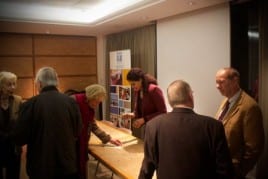
As we finalized the January Blog, two tragedies plagued our region. A terrible traffic accident took the lives of 8 residents, all women, of the Bedouin town of Hura outside of Beer Sheva. The women were on their way back from praying at the Mosque of Al Aksa in Jerusalem. Hura is one of the two Bedouin villages which the 2014 Israel Riders rode through. I sent our condolences to Mayor Muhammad al-Nabari and to the people of Hura for their terrible loss. The other tragedy is the murder of the Jordanian pilot, Muath Al Kassasbah at the hands of ISIL. Our new Program Associate, Fadi Baqain, from the same town in Jordan as Kassasbah expresses our sorrow at the end of this post.
David Lehrer
Conclusion of the Fall 2014 Semester
The Arava Institute’s Fall 2014 semester came to a close in early January after a week of final exams administered at the Ben Gurion University (BGU) Eilat campus. Students, interns and staff took the last few days before the campus emptird out to summarize, celebrate and say goodbye to new friends and colleagues.
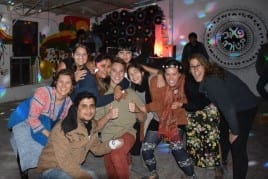
The final party of the semester had a herbarium theme to commemorate the Institutes newest addition to the student lounge. The festivities featured decorations and costumes ranging from farmers to specific plants while improv games and a retrospective slideshow of the semester got the ball rolling. The academic staff gathered to perform a poem that reminisced about semester events and adventures, and the Program Associates presented superlative awards to each student that highlighted their personality and contributions to the group. When the party was officially over, participants moved to the kibbutz pub to celebrate with the rest of the young kibbutz community.
While about half of the group is moving on from their time at the Arava Institute, we are excited to welcome the our returning students and interns for the Spring 2015 semester.
Evrona Oil Spill Conference
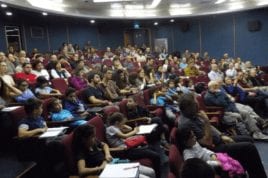
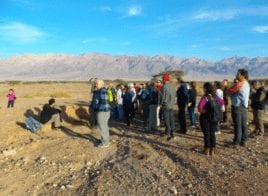
The Evrona Nature Reserve conference was organized by former Arava Institute intern, Hagar Ben-Shlomo and is the most recent in a series of discussions exploring environmental issues of the Arava region. Previous conference topics include the Yotvata Salt Flat and the Arava Heights. The fourth conference in the series will take place in May 2015 and will focus on the environment of the Ovda region.
Submitted by Hagar Ben-Shlomo
Spring 2015 Program Associate Profile: Fadi Baqain
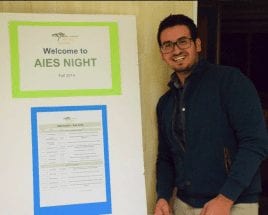
Fadi came to the Arava Institute to study for the Fall 2014 semester with plans to continue his studies at BGU for a Masters degree in Renewable Energy Management or Policy. Fadi’s independent research project at the Institute focused on the effect of dust on solar panel efficiency. He believes that green technology is the wave of the future and that studying here has furthered his interest in the environment and vegetarianism.
The Peace-Building and Environmental Leadership (PELS) course at the Institute has also allowed him to gain new perspective on the Israeli-Palestinian conflict – from the Israeli point of view. He especially appreciated learning about how the Holocaust has impacted Jewish and Israeli identity.
Fadi will join the Campus Life team as a Program Associate for the Spring 2015 semester, during which time he will also work on a project comparing case studies of renewable energy use in Israel and Jordan.
Intern Profile: Allyza Lustig
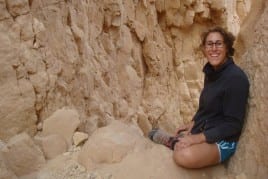
Prior to joining the Arava Institute, Allyza spent three years working with the International Research Institute for Climate and Society at Columbia University’s Earth Institute, where she focused on the use of climate information for decision making. She will be interning with the Arava Institute’s Development Department this spring, and plans to return to school for a Masters degree in Environmental Management/Global Environmental Policy this fall.
Intern Profile: Oren Rabinowitz
Oren Rabinowitz, age 23, was born in Jerusalem and grew up in New Jersey. He studied Ecology and 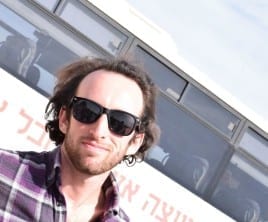
Oren recently began working with the Jerusalem Botanical Gardens. He is submitting his first research article this fall, and will be applying to graduate schools in the natural sciences next year.
Intern Profile: Jess Little

Jess Little, age 24, studied Chemical Engineering at the University of Washington and has been an intern with the Center for Trans-boundary Water Management (CTWM) since September 2014. He came to the Arava Institute after hearing about it during a study abroad program about water treatment and management at Jordan University of Science and Technology. During his time with CTWM Jess has been involved with constructed wetland greywater treatment systems in the West Bank. These systems provide a low-tech, low-maintenance biological method for treating greywater at the household level. Jess has been specifically focusing on the development of protocol for sampling and testing in the field, as well as developing manuals for users and technicians of the systems. Jess will continue his internship with the water team this spring semester.
Updates by Melanie Nakashian
Rest In Peace: Muath Al Kassasbah
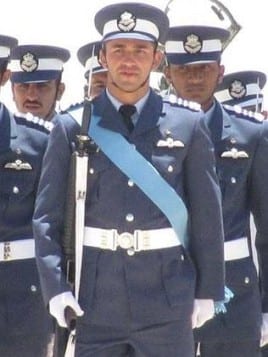
Al Kassasbah was from Karak, Jordan — the hometown of many Arava Institute students and interns. Program Associate Fadi Baqain knew him personally and was particularly saddened by the devastating news. Al Kassasbah paid the highest price to liberate the Iraqi and Syrian peoples. Our hearts are heavy with sympathy and his memory will be passed on to the next generation as a symbol of sacrifice.
The Arava Institute wishes to express condemnation of this brutal crime, as well as all acts of terror. The Institute considers our Jordanian students to be family and we resolutely stand beside them during this time. We send our condolences to the Al Kassasbah family and to the people of Jordan.
Submitted by Fadi Baqain


